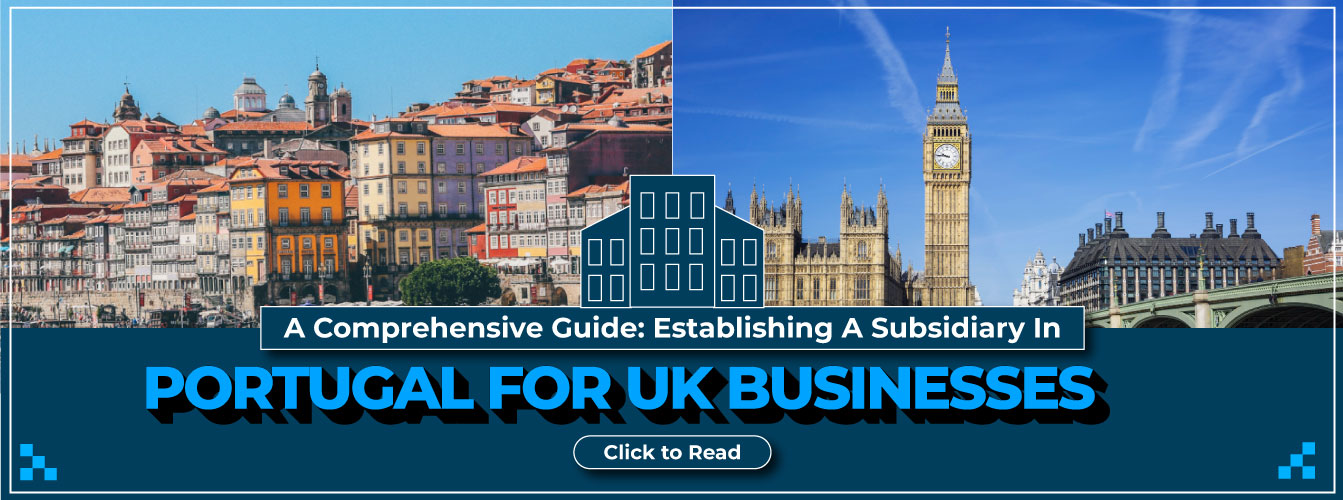
Expanding your UK business into Portugal offers strategic advantages, especially in the post-Brexit landscape. With access to the European Single Market, attractive tax incentives, and a highly skilled workforce, Portugal is an ideal destination for international growth. This comprehensive guide provides a step-by-step roadmap to help you establish and maintain a successful subsidiary in Portugal. Our approach is practical and insightful, designed to make the process straightforward while maximizing your business potential.
Access to the EU Market Post-Brexit
Creating a subsidiary in Portugal allows UK businesses to maintain access to the European Single Market, providing several key benefits:
Cost-Effective Hiring and Talent Acquisition
Portugal offers a highly skilled, multilingual workforce at competitive wage rates compared to other Western European countries. This makes it an attractive hub for:
Attractive Tax Incentives and Business-Friendly Environment
Portugal offers several favorable tax regimes designed to attract foreign investment:
Stable Economic and Political Climate
Portugal’s stable political environment, robust legal system, and supportive business policies provide a secure landscape for foreign investments. It consistently ranks high in ease of doing business, ensuring a transparent and efficient regulatory framework.
One of the most significant advantages of establishing a subsidiary in Portugal is the opportunity to hire local talent. Here’s why this can be a strategic move for UK companies:
Portugal is renowned for its highly educated workforce, particularly in technology, engineering, and professional services. Many Portuguese professionals are fluent in English, ensuring seamless communication and integration with UK operations.
Labor costs in Portugal are significantly lower than in the UK, providing substantial cost savings without compromising on talent quality. This cost advantage extends to:
Comparison of Salaries of Common Occupations (Source: UK Salaries: Talent.com, Portugal Salaries: SalaryExpert)
Occupation | Average Salary (UK) | Average Salary (PT) | Average Salary (PT) in GBP – 1.21 Conversion Rate |
Software Developer | £45,000 | € 25,000 | £20,645 |
Data Analyst | £30,000 | € 20,000 | £16,516 |
Project Manager | £50,000 | € 30,000 | £24,774 |
Mechanical Engineer | £40,000 | € 22,000 | £18,165 |
Graphic Designer | £28,000 | € 18,000 | £14,867 |
Marketing Manager | £55,000 | € 35,000 | £28,899 |
Customer Service Representative | £22,000 | € 15,000 | £12,389 |
IT Support Specialist | £27,000 | € 19,000 | £15,693 |
Human Resources Manager | £50,000 | € 32,000 | £26,426 |
Sales Representative | £25,000 | € 18,000 | £14,867 |
Portugal’s advanced digital infrastructure supports remote and hybrid working models, making it an ideal location for international teams. This flexibility allows UK companies to optimize their workforce strategy, leveraging local talent while maintaining a global presence. Moreover, remote work options are highly sought after in Portugal, making your job offer more appealing.
Employing Portuguese staff allows for more efficient management and expansion of European operations. This strategic advantage is particularly valuable for UK companies post-Brexit, as it ensures continued access to the EU talent pool without the complexities of international employment laws.
Selecting the right legal entity is crucial for your business’s success in Portugal. The most common structures are:
1. Private Limited Company (LDA)
2. Public Limited Company (SA)
Your choice depends on liability concerns, tax implications, and operational needs. Consulting with an English-speaking accountant and legal advisor ensures you select the most advantageous structure for your business goals.
Establishing a subsidiary in Portugal involves several legal and regulatory steps. However, the process can be straightforward with the right guidance from your legal and accounting team.
To create a subsidiary you’ll need to work with an attorney or an accounting firm that works with an attorney on your behalf. Here’s what you can expect:
Transfer pricing determines how profits are allocated among related entities operating in different countries. Proper transfer pricing strategies are crucial for:
In practice, this means that a defined approach must be used to determine how the subsidiary and parent company will invoice each other. This defined approach needs to be documented and then followed consistently. There are many ways to approach transfer pricing, but here are the most common:
Employment Contracts
Social Security and IRS Contributions
Key Employment Rules
Portugal can be a great place to do business. That being said, it’s not all roses. Here are the most common complaints and issues that we have heard from international business owners when doing business in Portugal: The most common complaint – and process you’ll need to adapt to – is the higher administrative load.
Expanding your UK business into Portugal brings exciting opportunities — but navigating the local legal, tax, and administrative environment can be complex.
At Elevate Accounting, we focus on supporting expats and international business owners as they establish and manage companies in Portugal – including creating a Portuguese subsidiary for a UK company.
Our team includes English-speaking accountants and business professionals who are familiar with the practical challenges of doing business across borders. Elevate was founded by an international entrepreneur who saw firsthand the need for structured, clear accounting support tailored to the expectations of global clients.
Here’s how we support your expansion:
Interested in learning more? Contact us to explore how we can support your business in Portugal.